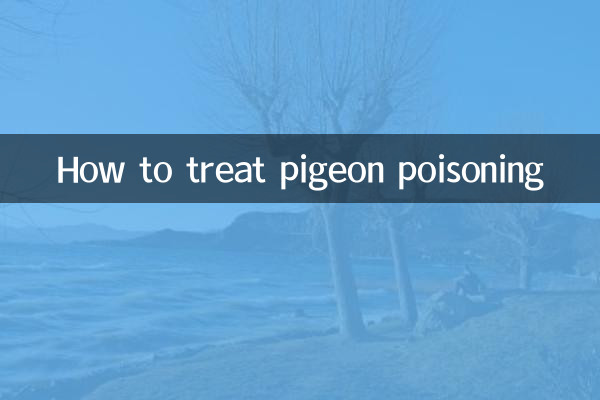How to treat pigeon poisoning
Recently, discussions about pigeon poisoning have become hot topics on multiple social platforms and pet forums. Many pigeon fanciers have reported that their pigeons have symptoms of poisoning due to accidentally eating toxic substances or environmental pollutants, and they are in urgent need of scientific treatment. This article will combine the hot content on the Internet in the past 10 days to sort out the common causes, symptoms and treatment plans of pigeon poisoning, and provide structured data for reference.
1. Common causes of pigeon poisoning

According to recent case discussions, pigeon poisoning mainly results from the following reasons:
| Poisoning type | common sources | Hazard level |
|---|---|---|
| food poisoning | Mildew feed, pesticide residues | high |
| heavy metal poisoning | Lead and mercury contaminate water sources | extremely high |
| chemical poisoning | Household insecticides and cleaners | Middle to high |
| Phytopoisoning | Accidentally eating poisonous plants such as oleander | in |
2. Typical symptoms of pigeon poisoning
Symptoms of poisoning vary depending on the type of poison, but the following symptoms require a high degree of vigilance:
| Symptom Category | Specific performance | possible poison |
|---|---|---|
| nervous system | Twitching, head and neck twisting, unsteady standing | Organophosphorus, heavy metals |
| digestive system | Vomiting, diarrhea, loss of appetite | Mildew feed, chemicals |
| respiratory system | Difficulty breathing, cyanosis of mucous membranes | toxic gas |
| systemic symptoms | Fluffy feathers, sleepiness with eyes closed | Various poisons |
3. Emergency treatment plan
Based on the experience shared by veterinary experts and pigeon raising experts, it is recommended to follow the following steps:
| processing stage | Specific measures | Things to note |
|---|---|---|
| Step one: Isolation | Immediately move to a ventilated and quiet environment | Avoid stress aggravating symptoms |
| Step 2: Detox | Give 5% glucose water or activated carbon suspension by gavage | It is prohibited to forcefully indoctrinate struggling individuals |
| Step Three: Detoxification | Use specific antidotes based on the type of poison | Professional veterinary guidance required |
| Step Four: Supportive Treatment | Supplement electrolytes and vitamin C | Maintain body temperature and hydration |
4. Preventive measures
Based on recent hot cases, you should pay attention to the following to prevent poisoning:
1.feed management: Store in a dry and ventilated place, and check for mildew regularly;
2.environmental safety: Avoid using chemicals around the pigeon loft;
3.Water source protection: Provide clean drinking water and replace sinks regularly;
4.Plant screening: Remove poisonous plants near dovecotes.
5. Selected Hot Questions and Answers
Based on frequent questions from netizens in the past 10 days:
| question | Professional answers |
|---|---|
| What should I do if a pigeon eats rat poison? | Inject vitamin K1 immediately, and the survival rate of treatment within 6 hours can reach 70% |
| How to deal with household disinfectant water poisoning? | Rinse the crop with plenty of water and give it egg white to protect the mucosa. |
| What tests should be done if heavy metal poisoning is suspected? | Blood lead testing and liver function evaluation are required |
If any abnormality is found in pigeons, it is recommended to contact the local poultry veterinarian immediately. The prime time for poisoning treatment is usually 4-6 hours. The content of this article combines recent hot topics in the pigeon breeding community and veterinary clinical guidelines, hoping to provide practical help to pigeon fanciers.

check the details

check the details